Important Note: The information in this article is for educational purposes only. You should never try to self diagnose or self-treat cancer. This is NOT a claim of any type of “cancer cure.” The information presented here should be considered in addition to (not to replace) the recommendation and/or treatments of your physician. Please consult your physician before including any supplements in your program.
Don’t have time to read? Here’s a quick summary:
- In terms of anti cancer effects, natural supplements vary greatly in their scientific support, and/or claims of potential benefit.
- Though well designed studies are always ideal, they are also limited because of how expensive they are to fund. So something (especially natural supplements) may be beneficial, but not well proven.
- When deciding on natural supplements, considering more limited forms of scientific evidence can still bring potential benefit, with little risk (assuming that you are not forgoing conventional treatments.) This is because most natural supplements are generally recognized as safe.
- The biggest things to consider are the potential for the supplements to interfere with your conventional treatments… and your ability to afford them (i.e. if they end up not working.)
- There is science that supports the potential benefit of Carnivora… but it is limited. These consists animal and petri-dish studies, only some of which have been published in English.
- A human clinical trial did reportedly occur, but I was not able to find the documentation.
- There have also been studies on the anti-cancer potential of one Carnivora’s main substances “plumbagin.”
- However, there is a lot of “expert testimony” to support the potential benefit of Carnivora.
- Overall, if you can comfortably afford it, I consider Carnivora to be an important addition for many cases… especially if your case is treatment resistant.
- BUT…, it may be best to take Carnivora BETWEEN cycles of conventional treatments, rather than during.
I often get asked by patients and clients if they should use Carnivora (Dionaea Muscipula/ Venus Flytrap Extract) as a part of their anti-cancer program…
As you can imagine, this question isn’t as simple as yes, or no…
So today I wanted to talk about my thinking process when addressing a question like this… and how it relates to Carnivora specifically.
We’re going to talk about:
- The science behind natural supplements against cancer
- Varying levels of evidence
- The limitations of scientific studies
- What we know about Carnivora (Dionaea Muscipula Extract)
- What you should consider for your case.
The Claims vs The Science
When you start looking into the world of “anti-cancer supplements,” you’ll see that there are many different choices… And each have their own set of claims.
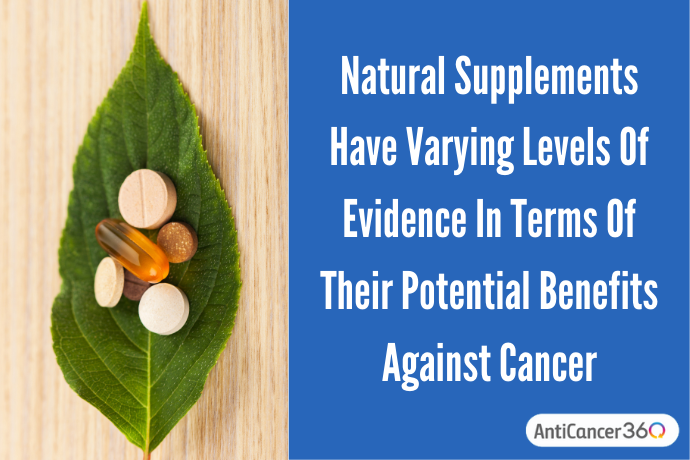
Natural supplements also have varying levels of evidence in terms of their potential benefits against cancer… and/ or their ability to support people undergoing conventional cancer treatments.
Different Levels of Scientific Evidence
Many supplements (and/or the substances that they contain) do have scientific research to support their use. However, the quality of this evidence can vary greatly.
Overall… experiments done on cancer cells in a petri dish are the lowest level of evidence.
Animal studies are a step up, but are still very limited.
And human studies are the best, especially if they are well designed.
Though it’s always best to rely on human studies, we shouldn’t totally ignore research from in vitro and animal experiments either.
The main reasons for this is that natural supplements usually pose little to no risk, in terms of creating harm.
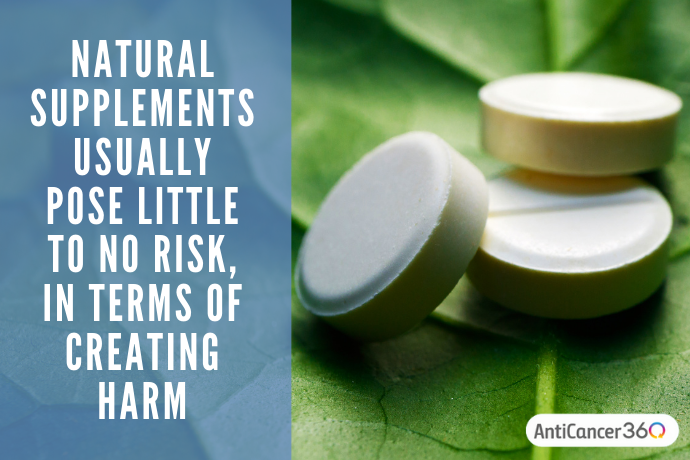
Even lower levels of evidence can give us some idea of whether or not a supplement could help, and the potential mechanisms behind their effects. So even if you partially base your decision on a lower level of evidence, the supplement will usually either help or do nothing at all (i.e. it won’t likely harm you.) More on this in a minute…
Different Levels of Experience Based (Anecdotal) Evidence
On the other hand, supplements may also rely on anecdotal evidence (i.e. testimonies of success.) And even this type of evidence can vary greatly in terms of credibility.
Some supplements for example, may have become popular because a few people tried them, and “cured” their cancer. As we all know, health and medicine can be very complex… So who knows what kind of “confounding factors” may have been involved in their cases (i.e. their success may have been due to something else, rather than the supplement.)
Although many people DO have good judgement/ critical thinking about the things that may (or may not) have affected their case… there are just as many who don’t. So this kind of testimony doesn’t really tell you much.
But more importantly, some of these supplements may have been successfully used in clinical settings, but without formal scientific publications to document their experience. It could also be that the scientific publication is only available in other languages.
Science Is Expensive… And Clinical Experience Isn’t Useless
Much like lower levels of scientific evidence, I don’t think that expert testimony should be completely ignored either. Rather, it should be evaluated on a case by case basis.
Ultimately, well designed human studies are the best… but they are not without shortcomings. The biggest issue is that they can be very expensive to conduct. A drug can take 10 years, and over 2 billion dollars to bring to market.
So if a scientist, research organization, and/ or private company decides not to study a certain substance (or supplement) to this degree… you might have something that is actually beneficial, but hasn’t been well proven by science.
We also have to consider that a clinician’s judgement isn’t totally useless. It’s definitely not definitive (clinicians have biases, different levels of training, and can easily overlook/ misjudge things), but we should still take this information under consideration to some degree.
Deciding On A Supplement
So the main issue is… how do you determine if you should choose a certain supplement, based on the information that is available?
Here’s my thinking process about these type of situations…
The lower the level of evidence to support a certain supplement, the MORE you’ll want to consider these factors below:
- Can this supplement be harmful to me? Most natural supplements are known to be safe. Many are even naturally occurring in foods, though we often take them at much higher does than you would get from food.
However, there are some supplements that can potentially cause harm, depending on the situation. But much of this can also be avoided with proper patient monitoring (i.e. blood tests, symptoms, etc…)
- Could this supplement interfere with my other treatments? Though the risk is quite low in general, there are some supplements that have shown potential to interfere with conventional cancer treatments [1],[2],[3],[4].
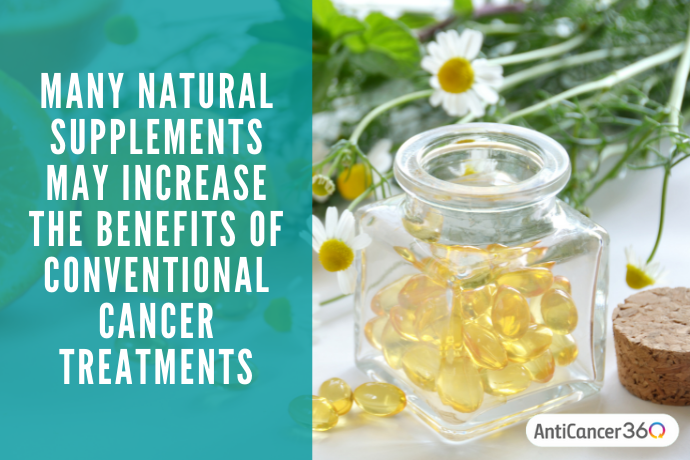
On the other hand, many natural supplements may actually increase the benefits of conventional cancer treatments, while protecting you from the potential symptoms and damage caused by side effects[5],[6],[7],[8]. This should be evaluated on a case by case basis, depending on the particular supplement + chemotherapy (or radiation) combination.
A higher risk (higher reward) approach would be to take the supplement with your other treatments at the same time, depending on the available research.
A low risk approach would be to take the supplement away from the conventional treatment (ex. between doses, and/or cycles of chemotherapy.)
- Can I afford to take the supplement? This is perhaps the biggest question to consider. In most cases, the worst case scenario for natural supplements is that they will do nothing to help you. And when you are working with very limited information (in terms of science) the risk of this goes up. In this case, I only recommending spending “disposable income” on these types of supplements. This way you minimize the risk of “financial harm.”
So if you are taking these things into consideration, you’ll be minimizing any risk associated with taking natural supplements when you are fighting cancer.
Ultimately, if a supplement meets these criteria below, then it’s a good idea to take it….
- The supplement won’t harm you.
- It has little chance of interfering with your other treatments.
- It has a significant possibility of benefit.
- You can comfortably afford it.
So What Do We Know About Carnivora?
Some of the information we have about Carnivora comes from published scientific journals. Some of it comes from documented expert testimony. The biggest problems is that most of the scientific literature on Carnivora is only available in other languages (i.e. mostly German, but also Bulgarian.)
The Science Behind Carnivora (and It’s Anti-Cancer Components)
While it may be limited, there are some scientific studies that support the benefits Carnivora, and the individual plant chemicals that it contains.
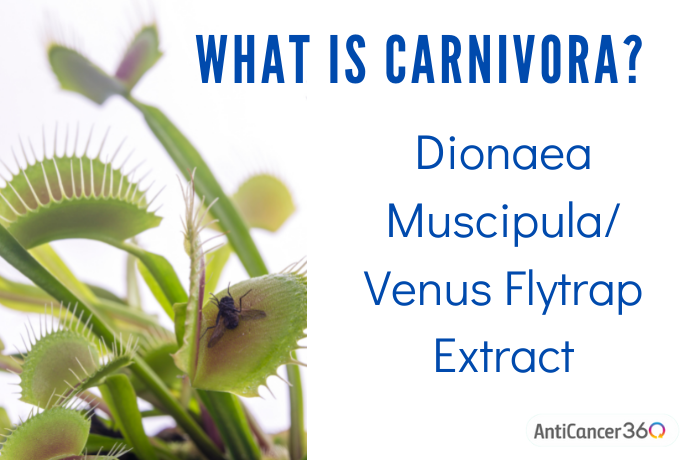
Many of these studies were done by Dr. Deiter Todorov, who was a head researcher at the National Oncological Center in Bulgaria. Of the many studies that he conducted on Carnivora [9], I know of only 2 that are available in English [10],[11].
Though based on in vitro and animal experiments, these studies found that:
- Carnivora did have potential for anti-cancer effects in most cases.
- The dose of Carnivora, and length of time that it’s taken, may be the most critical factors.
- Carnivora often killed chemotherapy resistant cancer cells, just as well as it did chemotherapy sensitive cancer cells (and even more so in some cases.)
However, his studies also showed some important details that people should be aware of [12]…
Though Carnivora was found effective against a variety of different cancer cells, it was not effective against melanoma cells in his animal experiment.
Carnivora was also found to be toxic in very high doses… Though this is likely rare in people taking standard doses, there has also been a documented case of kidney toxicity that was likely caused by Carnivora [13]. But to give you some perspective, this type of situation can also happen from taking NSAID painkillers, and antibiotics… and it’s quite rare overall [14].
Cases like this really highlight the importance of working with a qualified health practitioner, and the importance of monitoring your blood work, even when taking natural supplements.
Individual Chemicals Found In Carnivora
Overall, an extract of the Venus Flytrap plant (i.e. Carnivora) is going to contain a huge cocktail of different plant chemicals. So beyond the studies that looked at Carnivora itself, others have looked into some of these individual chemicals for their potential anticancer effects.

Venus Flytrap extract contains a wide variety of anti-cancer compounds that are also common in fruits, vegetables, and plant foods (i.e. quercetin, ellagic acid, gallic acid, chlorogenic acid, kaempferol, etc…)
But the most notable plant chemical found in Venus Flytrap Extract is a compound called “plumbagin.”
Plumbagin’s anticancer potential comes from it’s ability to generate oxygen radicals in the cancer cells, and interrupt DNA to prevent cell multiplication [15],[16],[17]. These effects are similar to some common chemotherapy drugs. Plumbagin has also shown to help against cancer and metastasis in animal studies.
Carnivora In A Clinical Setting (and Other Anecdotal Evidence)
So aside from the science that’s available on Carnivora and Venus Flytrap Extract, there is also some anecdotal evidence that should be considered. And in this case, some of the information is “anecdotal” because the research isn’t available in English.
Carnivora is often used based on the experience of Dr. Helmut Keller. This is the German physician who first developed this extract from the venus flytrap plant in the 1970’s.
In a clinical trial that he (reportedly) conducted, 56% of his 210 patients went into remission, or had their tumors stabilized by using this extract. And though I wasn’t able to find any documentation, this study was apparently confirmed by the American Cancer Society (though the link has since been taken down [18].)
Dr. Keller was said to have had near a 98% success rate in patients who had not yet undergone conventional therapies [19], or those with early stage “micro tumors[20].” But again, I’m not aware of any formal documentation to support this claim.
Much of Dr. Keller’s work was published in a journal called “Acta Medica Empirica,” a publication by a German medical society focused on natural medicine [21],[22]. This journal apparently reported on “observational studies,” where clinicians likely documented and published their clinical results.
Modern day “evidence based medicine” would be suspect of this kind of research…. but again, completely ignoring these kinds of studies in a clinical setting may also be too limiting also [23].
Overall, since there were no actual research publications that I could find, nor analyze, I still consider all of this to be “documented expert testimony” (i.e. anecdotal evidence) more than anything else.
Other Practitioners Experiences (Including My Own)
Aside from this this, there have been other practitioners that have used Carnivora in a clinical setting with some success (myself included). Though this is only a single case, here is a video that one of my clients sent to me about her experience.
Again, though this is all anecdotal evidence, here are some other practitioners that support the use of Carnivora.
So Should I Take Carnivora?
So if you are currently fighting, and you are considering taking Carnivora, here are some things that you’ll want to remember.
Carnivora benefits most likely comes from 2 angles:
- One is through its ability to support the immune system.
- The other is from its cocktail of plant compounds (phytonutrients) that could have a variety of anti-cancer effects.
So…
- If you are taking chemotherapy, it may be best to take Carnivora BETWEEN your dose and cycles of chemotherapy and radiation therapy. The cocktail of phytonutrients makes it extra difficult to determine its potential interaction with treatments like chemotherapy and radiation therapy.
- If you want to protect your immune system during chemotherapy and radiation therapy, there are other supplements and methods that are less likely to interact with your treatments (i.e. because they don’t contain a variety of phytonutrients.)
- In terms of the phytonutrient benefits of Carnivora, it would be better to take combinations of single phytonutrients, that have shown (at least) some potential of increasing the benefits of the conventional therapies you are using.
- Other than these things above, if you are able to afford Carnivora without any issues… I DO think that it’s a valuable part of an anti-cancer program, to support the underlying health of your body. It may be especially beneficial if your cancer is treatment resistant.
Note: These things above are just general recommendations. Each person’s situation is unique, so these recommendations may not apply to your case. It’s important that you consult your physician, and other health care professionals as needed, before starting any type of natural supplement.

Most importantly, whatever techniques you choose, you’ll want to make sure to re-asses your situation regularly, and re-adjust your approach if needed. In most cases, if your situation doesn’t improve or stabilize in 2-4 months… the program should be adjusted (on a case by case basis.)
Overall, I consider Carnivora to be an important part of an anti-cancer program for most people. But each case is unique, so I hope that this has given you some insight on whether or not you should use Carnivora (and/or other natural supplements) for your particular case.
Did this article help you decide about Carnivora (and other natural supplements?). Do you have any questions that I didn’t address in this article? Let me know your thoughts….
Citations:
Gene Wei is a Board Certified Doctor of Oriental Medicine in the state of Florida, and the founder of AntiCancer360. He’s also a graduate of the University of California Los Angeles, and East West College of Natural Medicine.
His practice is focused on integrative and natural anticancer strategies. Over the years, he’s helped many people overcome difficult cancers… including some cases of “terminal cancer” which were able to be reversed with an “Aggressive Integrative Approach.”

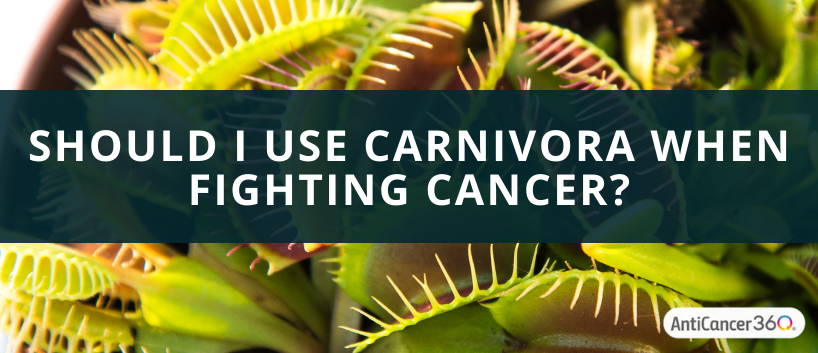





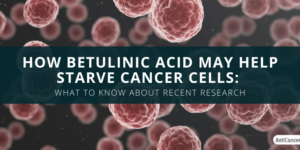
I don’t know if it is a miracle, but I was diagnosed with 4th stage GE junction esophageal regional cancer, metastasized to lymph nodes and surrounding tissues in April 2019. I started taking Carnivora after all my treatments of chemo radiation. Praise God all my endoscopy and ct scans have been negative so far. I heard the product advertisement on the radio years before and thought what could it hurt. I was told my cancer was in remission but would likely relapse after a year or so according to cancer statistics. So far the cancer is in remission. Is it the Carnivora? I don’t know but I continue to take it. Time will tell and I wonder if there are similar stories like mine.
Hi Cathy! We’re so happy for you! And yes! We’ve actually had a case like this in the past with an elderly lady who couldn’t do chemotherapy…